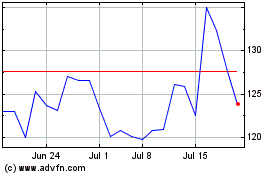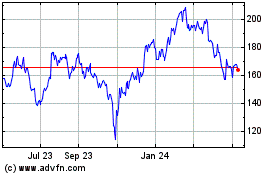Repligen Corporation (NASDAQ:RGEN) announced today that it has
enrolled its first patient in a Phase 1 clinical trial of RG2833 in
adult patients with Friedreich’s ataxia (FA). FA is an inherited
neurodegenerative disease caused by low levels of the protein
frataxin which results in symptoms that typically present in
childhood and lead to progressive loss of muscle and nerve
function, often resulting in loss of life by early adulthood.
RG2833 is an orally bioavailable, class 1 histone deacetylase
inhibitor (HDACi) specifically designed to increase frataxin
production in patients with FA. This study is being conducted in
Turin, Italy and is the first clinical trial of a drug that targets
the core genetic defect in FA.
The Phase 1 trial is a single ascending dose, crossover study in
up to 20 adult FA patients. It is designed to evaluate the
pharmacokinetic and safety profile of RG2833. Importantly, this
study will also evaluate the pharmacodynamic response of RG2833 on
various cellular and molecular biomarkers, including frataxin mRNA
and frataxin protein.
“This Phase 1 trial in patients will generate valuable
information on the safety and pharmacology of RG2833,” said Walter
C. Herlihy, Ph.D., President and Chief Executive Officer of
Repligen. “In addition, this study has the potential to provide
early evidence of clinical activity for RG2833 in the treatment of
Friedreich’s ataxia.”
“RG2833 is an attractive drug candidate, given its oral
bioavailability and potential to target and activate the defective
gene responsible for Friedreich’s ataxia,” said lead investigator
Luca Durelli, M.D., Chief of Neurology at San Luigi Gonzaga
University Hospital in Turin, Italy and lead investigator for the
Phase 1 trial. “The effects of FA are devastating for our young
patients and their families. I am happy to be involved with the
study and to help address the critical need for a therapy that has
the potential to slow disease progression.”
Friedreich's ataxia is caused by a single gene defect that
results in inadequate production of the frataxin protein. Low
levels of frataxin impair the function of nerves coordinating
muscle movements in the arms and legs and the nerve tissue in the
spinal cord and can lead to a life-shortening cardiomyopathy.
RG2833 is a Class 1 HDAC inhibitor that has been designed to
upregulate the frataxin gene and has been shown in preclinical
studies in animal models and patients’ cells to increase production
of this key protein. These results indicate that RG2833 may
increase frataxin production in patients and has the potential to
be an important treatment for Friedreich’s ataxia.
“Friedreich’s ataxia disease biology provides evidence that a
small increase in expression of the defective gene could
potentially slow disease progression,” said James R. Rusche, Ph.D.,
Senior Vice President, Research and Development at Repligen.
“RG2833 is the first compound that targets activation of this
defective gene. If our unique approach of using small molecules for
protein replacement is successful, it has the potential to
significantly improve outcomes for patients with FA. We are hopeful
that the Phase 1 trial will elucidate the role for HDAC inhibition
in FA, and inform future efficacy studies.”
RG2833 is a new chemical entity that is the subject of a
composition of matter patent and will remain in force until 2029
prior to any patent term extensions. Portions of this clinical
trial are supported by a grant from the Italy based patient
advocacy group GoFAR. Repligen’s additional research efforts in FA
have been partially funded with grants from the Friedreich’s Ataxia
Research Alliance (FARA), GoFAR, the Muscular Dystrophy
Association, the European Friedreich’s Ataxia Consortium for
Translations Studies (EFACTS) and the National Ataxia Foundation
(NAF). RG2833 has been developed in collaboration with scientists
from The Scripps Research Institute and a broad international
network of scientific thought leaders. Repligen is also evaluating
other HDAC inhibitors in animal models of Huntington’s disease and
cognition.
Orphan Drug Designations
Repligen has previously received U.S. Orphan Drug and European
Orphan Medicinal Product designations for RG2833 for the treatment
of Friedreich’s ataxia. Both orphan programs provide incentives for
the research, development and marketing of products intended to
diagnose, prevent or treat rare conditions and/or serious or
debilitating diseases with unmet medical needs. Orphan designation
grants the sponsor exclusive marketing rights for seven years in
the U.S. and ten years in the EU following regulatory approval of
the designated product.
In the U.S., rare diseases are defined as those affecting fewer
than 200,000 Americans. In the EU, rare diseases are considered
those that affect no more than five per ten thousand persons in the
community. The Company does not have active clinical trials of
RG2833 in the U.S. at this time.
About Friedreich’s Ataxia
Friedreich’s ataxia is an inherited neurodegenerative disease
caused by a single gene defect that results in inadequate
production of the protein frataxin. Symptoms of FA typically emerge
between the ages of five and 15 and include loss of strength and
coordination in the arms and legs, vision impairment, hearing loss
and slurred speech. Symptoms often progress to severe disability
and incapacitation requiring wheelchair use. Survival for
individuals with FA is generally 15 to 20 years after the first
appearance of symptoms. Patients generally die in early adulthood
from the associated cardiovascular, neuromuscular and/or diabetic
complications. There are approximately 15,000 individuals worldwide
living with Friedreich’s ataxia, however there are no available
treatments today.
About our External Collaborators
Repligen’s FA program continues to be supported by strong
relationships with and funding from non-profit organizations
including GoFAR, Friedreich’s Ataxia Research Alliance (FARA), the
Muscular Dystrophy Association (MDA), the European Friedreich’s
Ataxia Consortium for Translational Studies (EFACTS) and the
National Ataxia Foundation (NAF).
GoFAR - Friedreich’s Ataxia Research is an Italian, non-profit
organization dedicated to facilitating and promoting scientific
research for the treatment of Friedreich’s ataxia. GoFAR has
provided a $500,000 grant to support the operations of this
clinical study and provides additional logistics support for
participating families. GoFAR has also collaborated with Repligen
by coordinating patients and families to participate in
non-treatment research that has been important for developing
clinical biomarkers of drug treatment. For more information, go to
www.fagofar.org.
The Friedreich’s Ataxia Research Alliance (FARA) is a national,
public, non-profit, tax-exempt organization dedicated to the
pursuit of scientific research leading to treatments and a cure for
Friedreich’s ataxia. FARA’s mission is to slow, stop, and reverse
the damage caused by this disorder. For more information, go to
www.curefa.org. FARA has also participated in scientific
collaborations by organizing patient participation in research
studies associated with drug development.
The Muscular Dystrophy Association (MDA) is the nonprofit health
agency dedicated to curing muscular dystrophy, ALS, FA and related
diseases by funding worldwide research. The Association also
provides comprehensive health care and support services, advocacy
and education. For the latest research news and information about
diseases in MDA’s program, visit mda.org and follow MDA on Facebook
(facebook.com/MDANational) and Twitter (@MDAnews).
The European Friedreich’s Ataxia Consortium for Translational
Studies (EFACTS) is a European Community funded collaboration of 15
centers supported through the fp7 initiative to coordinate basic
research and develop a clinical network for the advancement of
treatments for FA. Repligen is the only non-EU member.
The National Ataxia Foundation (NAF) is dedicated to improving
the lives of persons affected by ataxia through support, education,
and research. NAF is a membership supported, nonprofit organization
established in 1957 to help persons with ataxia and their families.
The Foundation's primary purpose is to support promising ataxia
research and to provide vital programs and services for ataxia
families. For more information go to www.ataxia.org.
About Repligen Corporation
Repligen Corporation is a leading supplier of critical biologic
products used to manufacture biologic drugs. Repligen also applies
its expertise in biologic product development to SecreFlo™, a
synthetic hormone being developed as a novel imaging agent for the
diagnosis of a variety of pancreatic diseases. In addition, the
Company has two central nervous system (CNS) rare disease programs
in Phase 1 clinical trials. Repligen’s corporate headquarters are
located at 41 Seyon Street, Building #1, Suite 100, Waltham, MA
02453. Additional information may be requested at
www.repligen.com.
This press release contains forward-looking statements, which
are made pursuant to the safe harbor provisions of Section 27A of
the Securities Act of 1933, as amended, and Section 21E of the
Securities Exchange Act of 1934, as amended. Investors are
cautioned that statements in this press release which are not
strictly historical statements, including, without limitation,
express or implied statements regarding future financial
performance and position, the Food and Drug Administration approval
of our NDA for SecreFlo™, plans and objectives for future
operations, plans and objectives for product development, plans and
objectives for regulatory approval, product development, our market
share and product sales and other statements identified by words
like “believe,” “expect,” “may,” “will,” “should,” “seek,” or
“could” and similar expressions, constitute forward-looking
statements. Such forward-looking statements are subject to a number
of risks and uncertainties that could cause actual results to
differ materially from those anticipated, including, without
limitation, risks associated with: our ability to develop and
commercialize products and the market acceptance of our products;
reduced demand for our products that adversely impacts our future
revenues, cash flows, results of operations and financial
condition; the ability to obtain, and the timing and receipt of,
FDA approval for our NDA; our ability to obtain other required
regulatory approvals; the success of current and future
collaborative or supply relationships; our ability to compete with
larger, better financed bioprocessing, pharmaceutical and
biotechnology companies; the success of our clinical trials; new
approaches to the treatment of our targeted diseases; our
compliance with all Food and Drug Administration and EMEA
regulations; our ability to obtain, maintain and protect
intellectual property rights for our products; the risk of
litigation regarding our intellectual property rights; our limited
sales capabilities; our volatile stock price; and other risks
detailed in Repligen’s annual report on Form 10-K on file with the
Securities and Exchange Commission and the other reports that
Repligen periodically files with the Securities and Exchange
Commission. Actual results may differ materially from those
Repligen contemplated by these forward-looking statements. These
forward looking statements reflect management’s current views and
Repligen does not undertake to update any of these forward-looking
statements to reflect a change in its views or events or
circumstances that occur after the date hereof except as required
by law.
Repligen (NASDAQ:RGEN)
Historical Stock Chart
From Jun 2024 to Jul 2024

Repligen (NASDAQ:RGEN)
Historical Stock Chart
From Jul 2023 to Jul 2024
